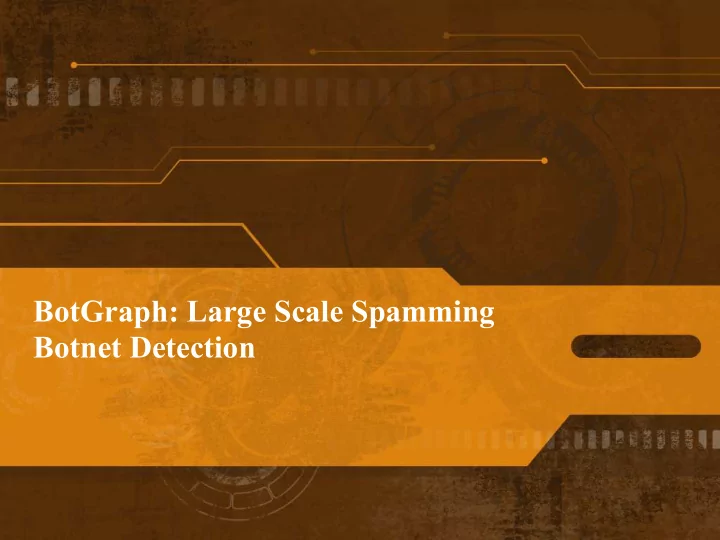

BotGraph: Large Scale Spamming Botnet Detection
Web-account abuse attack recent spamming technic New different approche for sending spam Basing on reputation of email providers Difficult to detect signup detection monitoring users' activity Very difficult to distinguish real user from bot
Solution? tricky, with two challenges 1. designing an algorithm 2. implementing working solution milions of users houndreds of gigabytes activity logs
Solution! bots != user real user bot user Rare and small Tightly connected corelations Spammers never fully Variable and small sent control infected emails per day rate computers Email size varies Higher and steady sent emails rate Emails templates
Problems but... real user bot user mobile users, proxies stealthy and dynamic ips possible counter average is not every technics false positive bot classification unwanted
BotGraph architecture
User login graph simple bot-users login behaviour user login graph vertices - email accounts edges - login from same ip address (ip-day) sharing ip address single bot handles ~50 bot-users single bot-user assigned to many bots over time autonomous systems metric vs dynamic ips and proxies
Giant connected component random graph theorem average degree d = n*p d < 1 => size = O(log n) d > 1 => size = O(n) bot-users forms giant connected component normal users' connected components are small (less then 100 nodes) components varies with sizes bot-users nets may intersect hierarchical extraction (increasing edges weight connection threshold)
legitimate users pruning based on the number of sent emails per day less then 10% users, sent more then 3 emails/day BotGraph consider only nodes, where at least 80% of users sent more then 3 emails/day validation based on emails size, account naming pattern much more effective with users' groups analising
Graph construction & analysis Huge size over 500 milions of login data in one month (220GB) userid, ip address, login timestamp number of edges - hundreds of billions 240 machine cluster 1.5 hours Dryad/DryadLINQ Finding connected component simple divide and conquer 7 minutes on cluster vs 4 hours on single computer
Two methods i.e. "first didn't work" method 1 method 2 partitioning by login ip partition by user ID address direct compare users in one map phase: outputs an partition edge for every two users generating local summaries of sharing an ip from AS used IP-day keys in partition reduce phase: weight and broadcasting them aggregation of edges upon reciving summary, sending related records merging recieved answers for broadcasted summaries
comparison i.e. "why it didn't work" method 1 method 2 sending edges of weight directly computing edge of one. They can not be weight w or more ignored
performance i.e. "how bad it didn't work" method 1 method 2 12.0 TB communication 1.7 TB interrupted 6+ hours 95 min 2.71 TB, 135 min (subset) 460 GB, 28 min 1.02 TB, 116 min 181 GB, 22 min (compression)
Results found 40 bot groups in January 2008 botnet size from few houndrdes up to few milions total of 20.58M of bot-users 16.41M EWMA - 91.83% new findings 8.68M graph-based - 54.10% new findings total of 1.84M of bot-IPs 240 784 EWMA 1.60M graph-based false positive rate estimated: 0.44%
Questions?
Recommend
More recommend